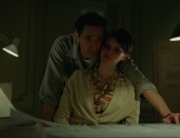In the near future, things are bleak (you’ve seen it before, but it’s a little different this time) as Earth runs out of food and dust blows all over—global warming? Who knows, but it’s happening and it’s bad. At least that’s what we can see in the world that Matthew McConaughey’s Cooper exists in. He’s a farmer, once a pilot and engineer, and a father to a son, Tom, and daughter, Murph (Mackenzie Foy).
Things look bleak, but mysteriously the little girl finds some sort of code in her bedroom. Wait, is it a code? No, they are coordinates that lead Cooper and Murph to a facility where the remnants of NASA is planning to find a planet out in the solar system that will sustain human life. And, as luck/fate would have it, Cooper’s old professor (Michael Caine) is there, and he would like Cooper to head the team out “there.” But what about his kids?
How this happens is complicated. Some in the audience may need a pad and pencil to keep up with theories of theoretical physicist Kip Thorne (who is one of the executive producers and a consultant on the film), not to mention Stephen Hawking, Carl Sagan Albert Einstein, and pick-a-scientist, but that’s not really what’s at the heart of the film. It’s really about this father and daughter and families and LOVE, in big capital letters.
Like in Christopher Nolan’s previous big, brainy, studio epic, Inception, time is a matter of concern. Cooper sets out into space via a wormhole, basically a black hole but a bit different (you’ll know it when you see it), along with other astronauts (Anne Hathaway, Wes Bentley, David Gyasi). They travel to a certain planet that doesn’t follow the same time rules that we have here. So not only is the clock ticking regarding the resources on Earth, but time goes by at a different rate altogether, as this planet translate hours to years. By the time Cooper returns to his ship, an entire generation has gone and his kids are grown up, disconnected from their father, with daughter Murph (now played by Jessica Chastain) smart (or smarter) than her old man and embittered by his absence.
There’s so much to digest with this movie on a first go. Nolan aims no less than to chart an intimate story of love and loss and what it means in the, I’m not kidding, cosmic scale. Hathaway even has a monologue, a bit clunky at that, attempting to chart the Love-Conquers-All phenom. He also has set out to produce a space epic that will get this movie lumped with 2001: A Space Odyssey and Close Encounters of the Third Kind in practically every review (it’s happened in the positive, so-so, and negative ones). Coincidentally for the latter comparison, this was originally a Spielberg production before he backed out.
The film has that Spielbergian parental-issue thing going on, and that’s fine. There were some instances, emotionally speaking, that I wish were not spelled out so much. But what’s most impressive after three uptight Batman films is that Nolan kind of loosens up in the first act set on Earth. While the whole planet is in peril supposedly, Nolan doesn’t venture outside of Cooper’s small town where dust is everywhere a la The Grapes of Wrath. He makes the focus more about this family and a father and daughter bond that would be cheesy in a more conventional director’s hands. It’s also of significance that Nolan works with a new cinematographer, Hoyte van Hoytema (of Tinker, Tailor, Soldier, Spy and Let the Right One In), who brings a soulful, even poetic eye to these proceedings.
McConaughey has to carry a lot in certain scenes. There’s also another actor—he’s not listed on the poster and I feel to single him out would be a bigger spoiler than anything involving the space stuff—who is very good when he appears in a third-act twist. But what’s most impressive of all is the marriage between the solid emotional backdrop from the beginning that carries over throughout and the tremendous special effects.
How tremendous? No green screen, for one thing. What you see is what you get, likely done the Kubrick way (hence the comparison, in some part, albeit there’s dialogue lifted verbatim from 2001 set to Hans Zimmer’s organ score inspired by that movie). The only nitpick here is that, once or twice, I wanted a shot to go on just a little longer, just for the awe. By the time that third act rolls around, the movie does its job in terms of giving bang for the buck.
It’s not perfect and probably not great, either. There are times the emotions get close to, or just are, cloying, and there’s so many tears shed you might think it has moved into tearjerker territory. Does it earn them? It depends on the viewer, if what was set up early on connects later through (literally) space and time. Nevertheless, the actors all bring their A-game, especially Caine in his few scenes. He always does so much with seemingly so little, and he helps give this story of What is Love and Life and Responsibility something to stand on.







Leave A Comment